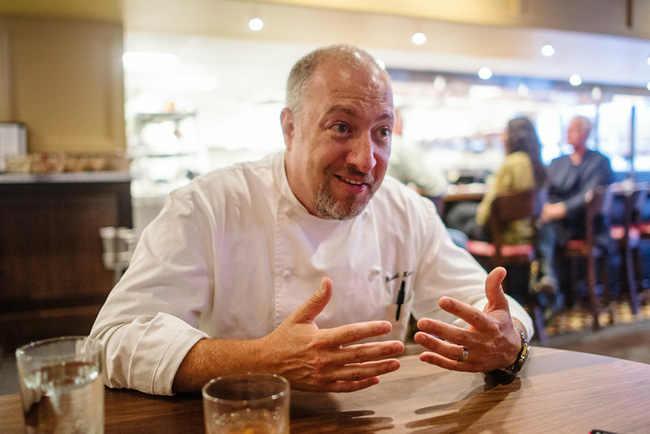
Since opening St. Paul’s Meritage restaurant with his wife Desta in 2007, Chef Russell Klein has been a fixture of the Minnesota food scene. From absinthe to oysters to cassoulet, Meritage is known for its thoughtful refractions of Continental cuisine, with a few homey touches (matzo ball soup, anyone?) giving the menu a warm, comforting glow.
But if you ask him why the restaurant has connected with diners, he’ll steer away from pomp and circumstance and point to two things: soulful food that satisfies and a dedication to hospitality.
We recently talked with Klein at his newly opened Minneapolis restaurant Brasserie Zentral. In a conversation that flowed over the course of hours, Klein talked about kitchen discipline, the pitfalls of modernist cuisine, his Foreign Legion wine and cheese bar, and his love of Mancini’s.
We also ate a whole roasted chicken stuffed with foie gras and brioche, served with kasha varnishkas, seasonal vegetables, and a gravy of the gods known as “sauce suprême.” The chicken’s skin was improbably crackly, the meat incomprehensibly rich and moist, and the whole effect was transcendent: you wouldn’t think, and in fact couldn’t imagine that something as prosaic and comfortable as a roast chicken could kick your pleasure center out into deep space. And yet, there you have it.
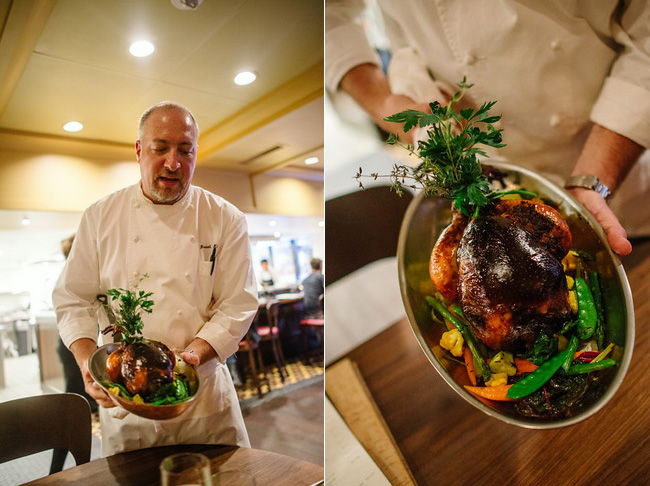
HEAVY TABLE: How did you get started in this business?
RUSSELL KLEIN: I started in the front of the house. My first restaurant job was at 16. I was a busboy at a high-end steakhouse like Manny’s. I made more money at 16 — that’s 25 years ago — than I made probably until I was a head chef at [W.A.] Frost. It’s like the late ’80s, and I was taking home $700 a week in cash. I bought a car… so I fell in love with the restaurant business!
Now as an owner, I’m like, “there’s no money in this business!” There are probably weeks when the busboys make more.
So I started at the front of the house, and I’ve pretty much done every job there is. I’ve never held the title of host, and I’ve never held the title of dishwasher, although I’ve done both for periods of time. More dishwasher than host.
HEAVY TABLE: It seems like there are two main facets to being a chef — being good at cooking food, and being skillful at running a kitchen. How did you learn how to do those things in tandem?
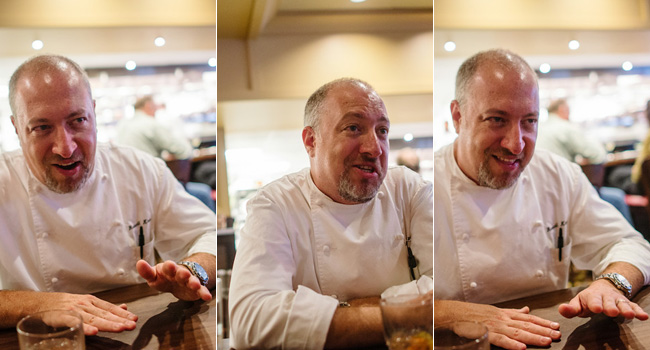
KLEIN: You can go to culinary school and learn how to cook, but they can’t teach you how to be a chef. That you kind of have to learn on your own. And a lot from other people, from the people you work under.
You know, Cyril Renaud was the first guy I worked for when I came back from France, he was at La Caravelle [in New York City]. And he more than anybody had a huge impact on me. It was not just him, it was where I was at. I was sponge. I was so ready to soak up anything anyone would show me.
I’ve learned as much what not to do as what to do.
HEAVY TABLE: What shouldn’t you do?
KLEIN: I think in the olden days — Lenny Russo and I talk about this a lot — when we were coming up and working for the old French guys… they’d almost literally kick you in the ass. The yelling, the screaming… that was just part of the culture.
That’s changing now. I’m not sure it’s for the better. There’s a discipline that has to be present in a kitchen for it to function well and for the food to be consistent. I’m not saying that yelling at people is the answer, but discipline is a necessary thing for a kitchen to run properly. I always tell people, “this isn’t a democracy; it’s a benevolent dictatorship.” Benevolent!
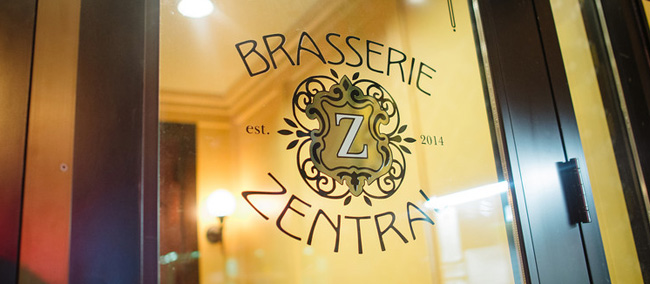
HEAVY TABLE: My friends growing up who became chefs… for them, it was almost a choice of restaurant kitchen, or the military, or jail.
KLEIN: Well, the kitchen brigade is based on the military brigade. It was developed in France, and it’s based on the French military structure, so there’s a history there. The kitchen is an interesting place. You get certain types of people — the hellion guys — where it’s a choice: it’s the army or the kitchen.
And then you get these sorts of intellectual guys, like Chris Olson. He looks at food from that cerebral kind of place, and goes from there.
I feel like I’m somewhere in between. My degree is in political science, and I worked political campaigns for a number of years… and for me it came down to am I going to go to law school or am I going to go to culinary school? And I went and talked to a bunch of lawyers, and I went and talked to a bunch of chefs that I knew…
And it was interesting. All the lawyers said, “You know, I don’t really like what I do, but I love the money.” And all the chefs said to me, “I love what I do, I just wish I made more money.”
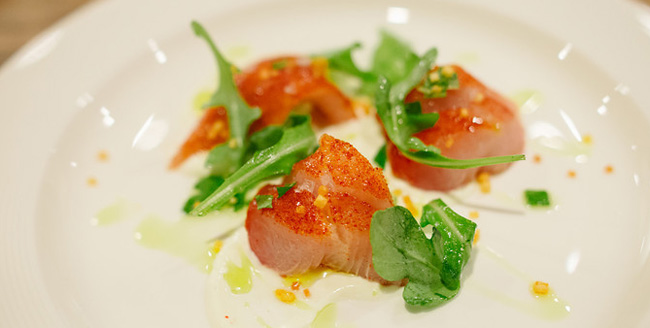
It was a fork in the road for me. Was I going to choose something I love to do and hope I can make a good living at it? Or am I going to pursue something where I punch the clock and collect my paycheck when I’m done? Obviously, I chose to follow my heart a little bit. Which may or may not be a wise thing to do.
You gotta be crazy to be in the restaurant business. I love it, I love what I do… but this business makes no sense anymore.
HEAVY TABLE: How so?
KLEIN: The cost of everything is the first thing. The margins in the restaurant business are pennies — four or five cents — on the dollar. Take your eye off the ball for a minute, and now you’re losing money. People don’t understand that.
HEAVY TABLE: Why did you branch out and start Zentral?
KLEIN: The developer here came to us repeatedly, and we kept saying no. Honestly, I mean, did I need more stress? I look at pictures of myself seven years ago, before we opened Meritage and it’s like Obama… I had hair, it wasn’t gray… It takes a toll.
And working with your spouse has its own challenges to it. I wouldn’t do any other way… but seven years in, Desta and I, we’re in a new place in how we’re handling that equation. It’s better than it has ever been.
For the first three months [of Meritage], I would cook, and Desta would [expedite orders]. Husband / wife doing it? The staff would just duck. But we’ve had so many people who have been with us the whole time. That’s something we’re more proud of than anything, the team of people who come on board this ride with us, and who have chosen to stay, or who have left and come back.
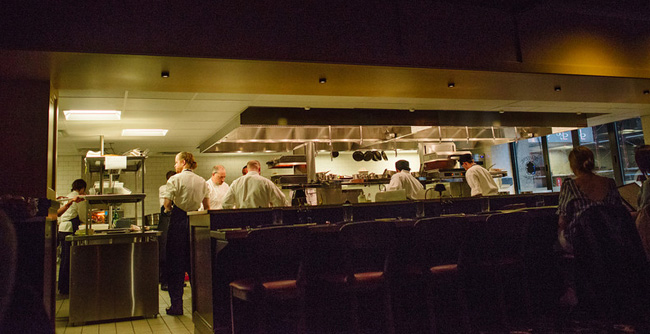
HEAVY TABLE: When you go to a restaurant that feels on top of its game, and really comfortable, a lot of the time that’s because there are people there who have been there forever and know the systems really well.
KLEIN: A restaurant is a team. It doesn’t matter if you’re the Twins or Zentral, a team takes time to gel. You and I have talked about reviewing restaurants early on, and you made an interesting point that I haven’t heard before, which is that as many restaurants decline after their opening as improve. We had a considerable pre-opening budget here for training, and I think it showed. We did three weeks of training, and that’s payroll — three weeks with no income.
We gave [the staff] a lot of materials, and they tasted everything… and I think the service was good when we opened, but what it lacked was muscle memory, and there’s no substitute for that. Three months in — and we haven’t hired a new server since we opened — they’re getting better. They’ve got muscle memory now. They know instinctively what I’m looking for from them. That’s a hard thing to wrap my head around sometimes, how much the staff wants to please me. Not me Russell Klein, but the chef. It’s priceless to me. I’m humbled all the time.
We’ve had slower weeks here over the summer, which is to be expected, but nobody has bailed on us. They believe in what we’re doing, and they’re confident in it. They feel like they’re part of something. I learned this from Desta; I wasn’t always the biggest cheerleader for the staff, to my detriment. That’s one of the ways I’ve grown as a chef as I’ve gotten older.
We always say we hire for brains, and for work ethic, and for passion. If your parents didn’t give you those three things, there’s nothing we can do. IF you have those things — and even two out of three can probably get you by — then the restaurant works.
I always tell people it’s just dinner, and tomorrow it’ll be shit, literally. Let’s keep it in perspective. One of the things I struggle with as a chef is the glorification of chefs.
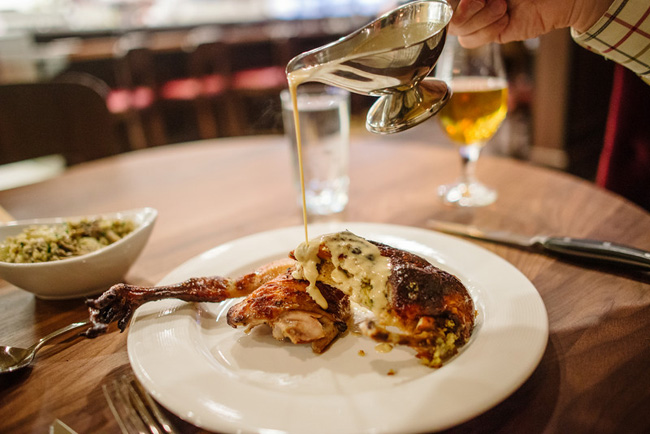
HEAVY TABLE: How did you develop the Zentral concept and research the recipes?
KLEIN: The recipe research is my absolute favorite part because it involves travel. The roots of Zentral are that the developer here came to us 2½ years ago and sat in Meritage, and said, “I’ve got this building, and you’re going to open the restaurant.”
And he wasn’t the first developer. Once you have a successful restaurant, it’s amazing… it’s so hard to get your first one open, and after that everybody wants a piece of it. And you have to say no.
So we kept saying no. And David Shea was his architectural consultant… And he came to us and said, “I want you to open Meritage West.” And we said, “No way.” Creatively speaking, I needed something different. Although I will say that creativity is probably the most overrated quality in a chef.
HEAVY TABLE: Well, ideas are a dime a dozen. It’s all about execution and perseverance.
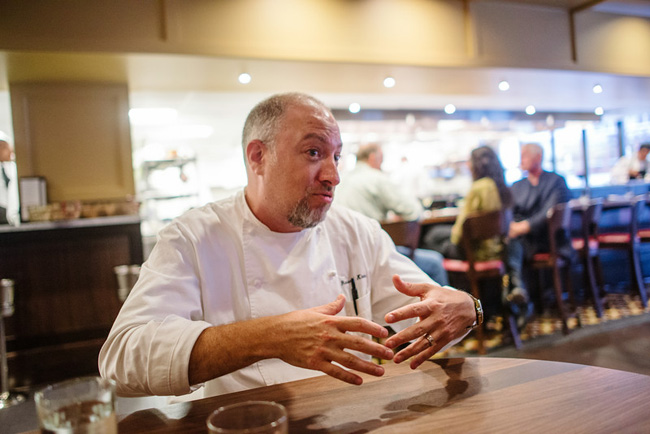
KLEIN: There is a creative aspect to it, and I love French food, but I really wanted to do something else, and this is still a small market, and having two Meritages around here doesn’t make sense. But he wanted something in that style.
Around that same time, we took our first trip to Germany. It was a road trip. We started in Munich and went [through the Bavarian] Alps to Berchtesgaden, which is spectacularly beautiful, if you can overlook the fact it was Hitler’s playground. Germany has such weird history, especially if you’re there as a Jew.
We [went from] there to Salzburg, to Vienna — and in between to Wolfgangsee, which is a mountain lake town — all the way to Hungary: to Tokaj, and at that point you’re 20 kilometers from the Ukrainian border.
So we fell in love with the region in a way we didn’t expect. We fell in love with Austria, and that dovetailed with my heritage, which is Austro-Hungarian. When we were eating in Austria, I had this feeling like: “All of this seems kind of familiar…” in a removed way. It wasn’t specific. But there was something there that reminded me a little of my grandmother’s cooking, in that her idea of seasoning was sprinkling a little bit of paprika on things.
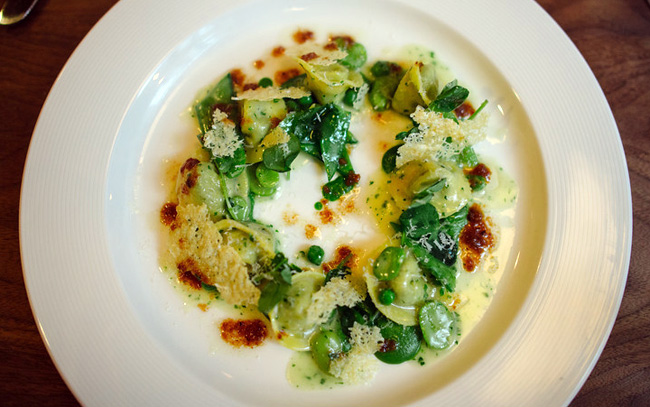
Especially in Hungary we saw that a lot. I worked for a while in New York for David Bouley at a restaurant called Danube, which is no longer there. It was ahead of its time, and it was an Austrian restaurant. It was populated by lots of Austrian people in the kitchen as well as in the dining room. It was my first exposure to fine-dining Austrian cooking. I loved it. Absolutely loved it.
It’s jibing with some of my heritage and some of my culinary heritage, and the food felt right for our location here in Minnesota. Lots of German heritage. One of the things that’s been interesting for us is people saying, “Well, it sounds so heavy.” The food is rich, because it’s fine dining food, but it’s not heavy. There’s a lot of acid, we work very hard to lighten it up. Winter will come… And we’ll do borscht at some point, and I’ve had people ask for goulash. I worry if I put goulash on the menu, people will think it’s elbow macaroni and ground beef. We’ll see.
HEAVY TABLE: Well, that’s a really interesting thing about the concept to me. You’ve got Vienna at its height, serving up some of the world’s most sophisticated food: food as art. And then you get out to the Slavic hinterlands, and things get much more heavy, and simple, and comforting.
KLEIN: That’s one of the things that spoke to us about the region. Vienna to this day, it’s very elegant — the people walking around are elegant, the cafes… but then you drive an hour outside the city and you get dumplings. They’re not fancy… and they’re not light, but they’re tasty.
One of the things we set out to do with the food here is to return to cooking. To get away from smoke and mirrors.
HEAVY TABLE: What’s an example of smoke and mirrors?
KLEIN: I think there’s a place for everything. One of things that’s been interesting to me over the past few years is the modernist movement. Thirty years ago you had nouvelle cuisine, and there are elements of nouvelle cuisine that are with us today because they were good. There will be elements of modernist cooking that will be with us in 30 years because they’re good.
We’ll sometimes use lecithin in our cooking because it’ll help us hold a sauce together. There’s a place for “meat glue” [a modernist cuisine enzyme]. Sometimes you can use it, and frankly have less waste and be more efficient, which is in my interest as an owner and your interest as a diner because the more efficient we are, the lower we can keep our prices. There’s a place for buzzing a sauce with a hand blender to get a little air in it.
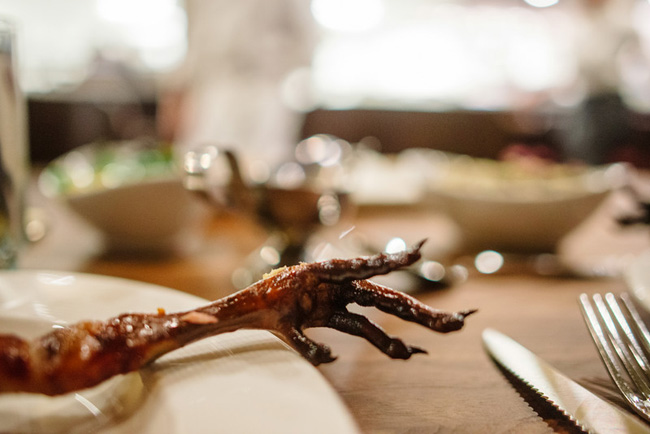
We don’t put things in chargers or canisters. I think putting things in — What do you call it: the spherification of things and all that? That’s a chef saying, “Look what I can do.” There are very few Grant Achatzs in the world. Grant Achatz is a genius. But there’s a thousand guys trying to be Grant Achatz who don’t have his talent. I don’t have his talent. I’m not a scientist. I think there are too many guys fucking around with that stuff who shouldn’t be. Ask ’em: “Can you make a mayonnaise? Can you roast a chicken?” I don’t know if they can.
Chefs are constantly complaining about the kids coming out of culinary school, but there’s some truth to it — they all want to play with that stuff, but they need to learn the basics.
HEAVY TABLE: As a diner, I want a meal like that once every three years, maybe, to remind myself of what’s possible.
KLEIN: In any field, it’s important that someone push the boundaries, and Grant does that. But there are a lot of restaurants in this town who do those kinds of things — or cook out of the Alinea cookbook, or whatever — and you know, they’re not Grant Achatz, they’re not going to pull that off.
So as we wrote the menu here, we had months to work on the menu and work on the food. So when we opened, every dish had been tested and retested…
HEAVY TABLE: Where were you drawing those recipes from?
KLEIN: Travel. Travel inspires me. And I read a lot. I think all chefs read a lot of cookbooks. It’s not that we’re copying out of the books, but we’re inspired.
KLEIN: Cooking is all about technique — it’s not about recipes. Of course in a restaurant recipes are the only way you can achieve consistency, especially if you’re a bigger restaurant.
HEAVY TABLE: Is it difficult with Zentral that a lot people don’t necessarily have a reference point for Austro-Hungarian food?
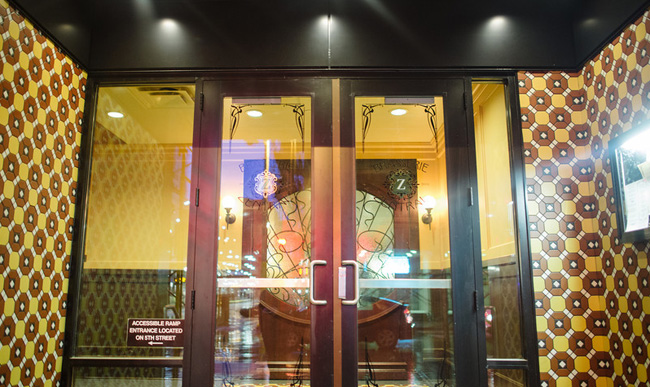
KLEIN: I had people warn me, “Whatever you do, don’t let people pigeonhole you as an Austrian restaurant.” You said it was a ballsy concept… It’s harder than just saying, you know, “We’re Italian.” We might be busier right away. But if it’s good food, it’s good food. At the end of the day, people will come and they’ll say, “Hey, I get this — it’s duck, it’s pasta, it’s lamb.”
HEAVY TABLE: Well, it’s not as though the menu is frozen in time. There’s some very modern stuff on the menu, it’s not just a time capsule from Vienna circa 1890.
KLEIN: One of the things that turns me on as a chef is the intersection of culture and food. So when you look at our restaurants, they’re grounded in culture. That’s intentional for us, because it’s what turns Desta and me on. I’m not saying we’re an Austrian restaurant. There are things here that are authentic, and things you’ll find that are not.
HEAVY TABLE: How do you weave that Austrian culture into Zentral?
KLEIN: There are specific dishes that speak to that. The schnitzel is that, and the boiled beef is a big one. There are restaurants in Vienna that do nothing but boiled beef, and they’ll have 15 different cuts of boiled beef. The most famous cut is Tafelspitz, which comes from the rump.
We do a Kavalierspitz which comes from the shoulder, and the entire reason we do that is when we recipe tested, the beef we were getting from the shoulder was better than the rump. And we tested grass fed; we tested this purveyor; we tested that purveyor, and over and over we liked the shoulder, the Kavalierspitz.
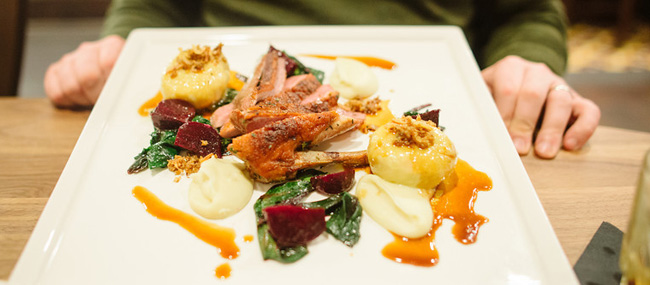
HEAVY TABLE: What’s the appeal? Boiled beef sounds kind of terrible.
But if I say pot au feu it sounds good… or bollito misto… In Austria they call it Tafelspitz or Kavalierspitz, but they’re essentially all the same thing. You throw the meat in the pot, throw in some burnt onion and simmer it gently — boiled, by the way, is a misnomer — it should never boil because it gets tough and cloudy.
What I love about it is I find it incredibly satisfying, and “satisfying” is the key word here. I don’t want to feel like I’m eating somebody’s art project, you know? I think we’re fairly priced, but we’re certainly not cheap. If you’re spending $100 for dinner tonight, you want to know that you’re getting something solid.
HEAVY TABLE: As a critic I get very unforgiving as meals get expensive. When you’re paying top dollar, you deserve something solid.
KLEIN: For our first wedding anniversary we went to Tru in Chicago when Tramonto was still there — a big deal, right? It was awful. Awful! It’s the only fine-dining meal like that where halfway through I couldn’t wait for it to be over. But would I have made that same judgment if I was dropping fifty bucks as opposed to a couple hundred for a tasting menu?
HEAVY TABLE: We once bailed on an anniversary reservation at Manny’s because the place was so loud that we couldn’t hear one another talk. At that price, that just didn’t work for us.
KLEIN: That was the thing. I had one critic tell me she was surprised because she thought the restaurant would be more “fun.” And what I think she meant, is that it’s not deafeningly loud in here. That was intentional. All these tiles up here are sound-masking tiles to keep the noise level down. Because you talk about food returning to being satisfying, we also want to see restaurants return to what they really are all about, which is not the glorification of the chef; it’s the person sitting across the table from you.
Whether it’s a business meeting or your anniversary, you’re there to talk. Can you imagine having this conversation in Butcher and the Boar or Bar La Grassa?… and I love those restaurants, but you can’t really have a conversation in there. So what’s the point?
HEAVY TABLE: Well, it’s a different kind of evening. It can be fun to get a big group of friends together at La Grassa and throw back a bunch of cocktails and yell at each other across the table.
KLEIN: And maybe that feels more fun…
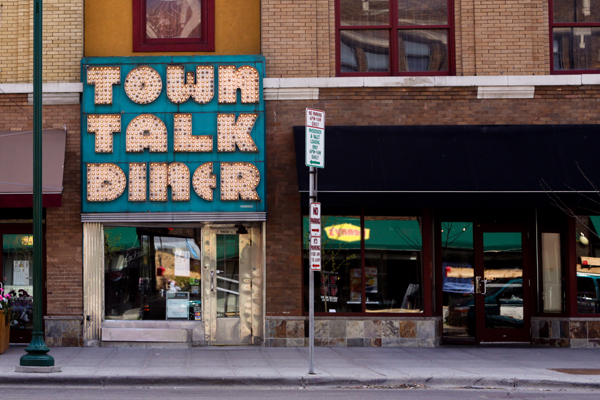
HEAVY TABLE: It’s external entertainment. Did you ever go to the old Town Talk Diner? That place was fun. And very loud.
KLEIN: You know, Tim Niver — he’s one who says he wants his restaurants loud. That’s his stated goal. I want my restaurants to have a buzz and an energy, but I want you to be able to have a conversation with the person you came with, because that’s why you’re here. You’re here for the person you’re with; you’re not here to bow at the altar of the chef.
On the other hand, you can’t argue with the fact that as chefs have gotten more high profile over the past 5-10 years, the quality of food everywhere has gone up. And there’s more of a market now for guys like me to do what we do. But we can give you great food and provide an atmosphere where you don’t have to scream all the time.
HEAVY TABLE: Over the past decade, things have really gone from kind of dire to amazing.
KLEIN: I moved here at the beginning of 2002. And there were like four restaurants I would apply for. I was working for Bouley — three star, four star New York Times restaurant — so I was looking out here for work, and at that time there was Aquavit and Goodfellow’s, and Vincent had just opened.
And somehow or another I ended up getting in touch with Lenny Russo, when he was at Frost. Now I look at a kid who is going to move out here, and there are dozens of restaurants that are worthy of a young cook who wants to learn and advance their career.
HEAVY TABLE: And there are a bunch of mid-range places that have a great, ambitious point of view.
KLEIN: The number of restaurants opening here is crazy. It’s interesting how the restaurant industry tracks the real estate industry in a lot of ways. That’s what happened with us [with Zentral]. That’s happening all over the place. You gotta wonder if we’re not in an apartment bubble and a restaurant bubble.
HEAVY TABLE: Maybe, but food has also become more important to people, culturally speaking.
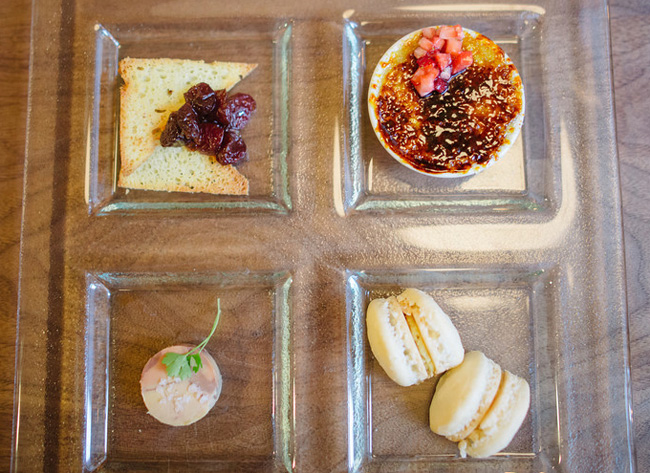
KLEIN: Desta says, “It used to be dinner and a show; now dinner is the show.” Dinner is what you do now. Everybody’s always curious about what we do back there and how we do it. It really is an amazing sequence of things that have to happen to get the plate of food to you, with food hot, at the same time that the other things arrive.
HEAVY TABLE: What’s doing well on the menu here?
KLEIN: The pastas have been a big big part of people’s experience here. It was a lot more pasta than I thought we’d necessarily go through.
HEAVY TABLE: I still think about that spaghetti and speck. That’s soul food.
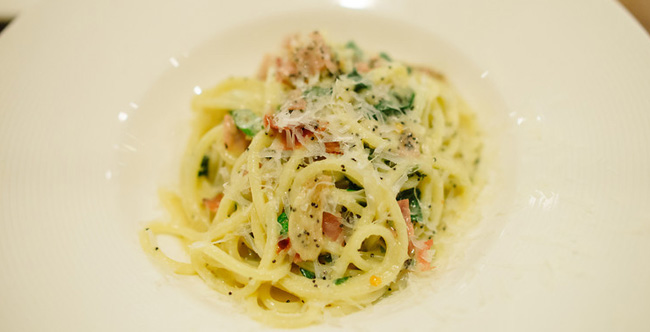
KLEIN: That’s probably my favorite thing on the menu. That was one… where does inspiration come from? It was totally just alliteration: spaghetti and speck. That was it. Inspiration comes from strange places.
At the end of the day, what do we want to eat on a daily basis? It’s not foams and gels and spherified olive oil. We want to eat roast chicken. A properly cooked steak. Stuff that just kind of satisfies our soul. That was what we’ve tried to do here.
HEAVY TABLE: What are the advantages and disadvantages of being in the fine dining sphere?
KLEIN: Are there advantages…? The advantage I suppose is that I can work with more or less the ingredients I want, because I can charge more. One of my philosophies is to try to give you an opportunity to spend as little or as much as you want to. The truth is if you want to come in here for $25, you can do it.
HEAVY TABLE: How do you do it?
KLEIN: Have a salad, a small pasta, and a glass of house wine, and you’ll be right there. You might even be less. Come for happy hour. I want people to come in here and not feel like they have to spend a ton of money, which is why I would never do a tasting-menu-only restaurant. I don’t want you to feel like you have to sign up for $100 a head.
HEAVY TABLE: Tell us about Foreign Legion.
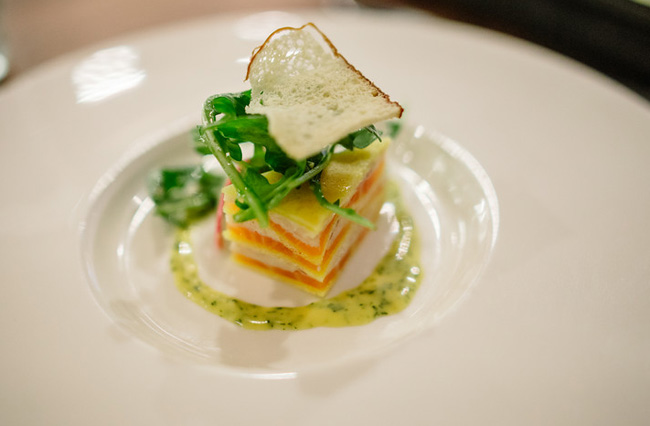
KLEIN: Foreign Legion evolved. Originally, there was supposed to be a grocery store and a liquor store on the other side. We always wanted to do a wine store. We looked into doing a market, but we don’t know anything about markets, and they’re a harder business than restaurants in some ways. But it evolved into doing a wine bar. The name came from [asking] “What do you want the place to be?” We wanted it to be a watering hole, like you go into a small town and go to the [American] Legion. But a little more exotic, from a foreign country — the Foreign Legion. It’s a wine and cheese bar. The wine bar I think is fairly obvious.
Personally, I’m not into the cocktail thing that much, when I drink cocktails it’s a pretty simple cocktail. I’m over the chipping your own ice, 20 minutes to get me a drink, curly mustache pretentious thing. So a cocktail bar wasn’t what I wanted to do. We’re wine people, so a wine bar was obvious. The cheese thing is actually the evolution of the original concept for Meritage that didn’t pan out at the time: having this enormous cheese program. At one point we were going to call Meritage “Mahon.”
I’m not a food snob. I like fried chicken; I like pizza. But cheese, though: I’m kind of a cheese snob. I can’t do processed cheese. Really good artisan cheese, made with raw milk hopefully: that I love. There is an entry point to get into [Zentral], but with Foreign Legion, I wanted something much more casual from a price point. It’s a sexy room, so it’s not exactly casual, but it’s geared toward small plates and being able to share.
The cheese program there will not be entirely foreign. I don’t care where it comes from. I want to get the best cheese we can get in any given week. We have amazing purveyors here, especially for cheese, so there are so many options. And once you start talking cheese, you start talking charcuterie and that sort of stuff.
HEAVY TABLE: You mention the Legion, I get this sense that you have a certain nostalgia for a simpler way of dining.
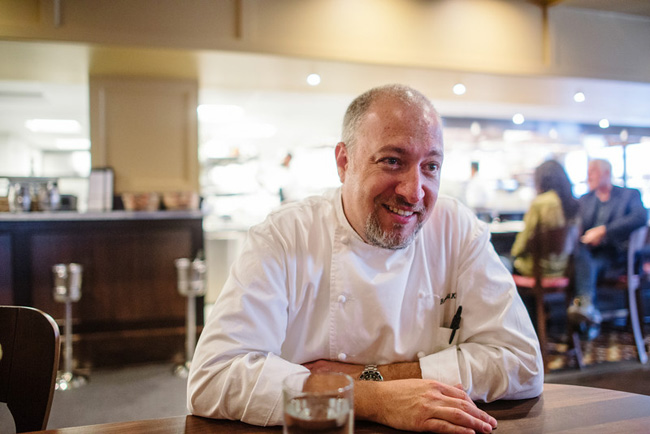
KLEIN: To me the ’50s and ’60s were the golden age of restaurants. Food was simple; people’s expectations were low; everybody drank… All your sales were cash. I talk to Pat Mancini about that a lot. His dad lived in that age, and it was great. I always tell people after Meritage, Mancini’s is my favorite restaurant in St. Paul.
HEAVY TABLE: It’s like all these supper clubs we have in Wisconsin; it’s like time travel via dining.
KLEIN: You get a stiff cocktail, a good steak; you don’t spend a ton of money, and I love the Mancini family. That’s another thing that’s sort of been lost. There used to be restaurants where they were family-owned small businesses, and now they’re increasingly corporate behemoths that are soulless and faceless. And that’s a shame.
I think the best question I’ve ever been asked in a restaurant was at Jean-Georges in New York. I sat down; the captain came over to me, and he said, “Are you comfortable?” Not “How are you?” but “Are you comfortable? Is your table and your chair OK? Are you relaxed?” I went on to have an amazing meal, but what I remember from that meal was that question. That sense of hospitality. I learned later that the guy was from White Bear Lake. I want our staff to essentially ask that question of our guests: “Are you comfortable? Are you relaxed? Are we helping you to decompress and escape for a few minutes?”
Another thing we didn’t really touch upon is how much my Jewish heritage has influenced this place and always has influenced my cooking. With matzo ball soup on the menu at Meritage, people always ask, “What’s that doing on the menu?” When I was writing the menu for Meritage, I was thinking of all my Italian friends who are chefs, and how they’re inspired by their grandmothers’ ravioli, and I thought, “Hey, my grandmother made stuff. I have a culinary tradition in my family.” There was a cultural heritage there that meant something to me that I wanted to share with you.
My Jewish heritage influences the cooking here: the stuffed cabbage, for example. And I’m working on stuffed peppers, but I haven’t been able to elevate it past home cooking, and when you come to a place like this I want to give you something that’s past that.

Great interview. Ate there a month ago and the food and service was amazing. The foie/brioche stuffed chicken is like getting a hug from your grandma. Kudos to Russell and Desta.